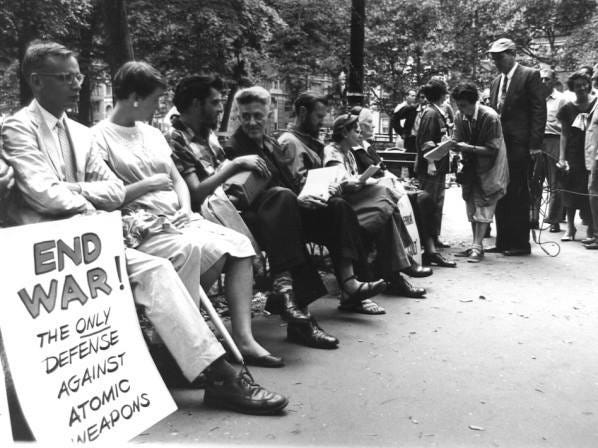Today is the monthly fast for peace, and it brings an end to the May-June challenge. The next one starts July 1; I’ll get a link put together soon.
June 15 also brings an opportunity to remember Dorothy Day, who was arrested on this date in 1955 for refusing to participate in New York’s mandatory civil defense drills. Nearly sixty, she challenged the idea that nuclear war was an acceptable possibility. Although the seven protesters pleaded guilty, the judge refused to give them any jail time.

The subtitle of a 2020 biography describes her succinctly: Dorothy Day: Dissenting Voice of an American Century. Her first arrest came as a teenager, protesting for women’s suffrage at the White House. She was sentenced to 30 days in jail, but the women were released on the 10th day of a hunger strike.
In 1933, she co-founded the Catholic Worker movement under an umbrella of ideas and methods similar to Gandhi's. The Catholic Worker was an inexpensive newspaper which she wrote for and edited. It promoted social justice, supported labor unions, the dignity of work, nonviolent direct action, and strict pacifism.
Gandhi and Day moved in some of the same circles, and had a mutual friend in London. Muriel Lester hosted Gandhi during his 1931 stay there; when Day visited three decades later, she insisted on meeting with the Christian socialist. The pair “shared reminiscences of their arrests, their travels, [and] their hopes for peace in the world.” Day also joined a 10-day fast in Rome to lobby the Second Vatican Council (unsuccessfully) to endorse nonviolence.
Her last arrest came in 1973, at the age of 75, by the side of Cesar Chavez, a student of Gandhi's teachings who had fasted for 24 days a few years earlier to inspire nonviolence in striking United Farm Workers. Dorothy Day spent 10 days in jail with dozens of women, and she wrote an open letter to the Catholic bishops criticizing their lack of visits. She had a habit of “admonish[ing] those in power who should have know better.”
A few years later, she was recognized for her lifetime of work with the Gandhi Peace Award. Dorothy Day died at the age of 83 on November 29, 1980, which I’ll be observing with a 3-day commemorative fast as I’ve done for Gandhi, MLK, and Chavez.
Today’s discussion question is inspired by Day’s arrest with the farmworkers in 1973. While they were incarcerated, she taught a class on the history of US labor relations. What topic could you teach a class on?


